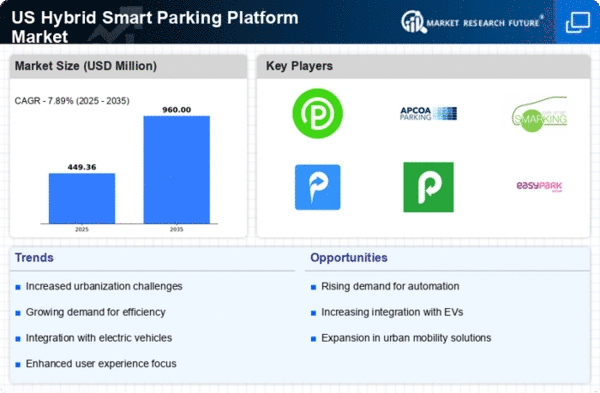Government Initiatives and Funding
Government initiatives aimed at improving urban mobility and infrastructure are significantly impacting the hybrid smart-parking-platform market. Various federal and state programs have been established to promote smart city technologies, with funding allocations exceeding $1 billion in recent years. These initiatives often include grants and incentives for municipalities to adopt smart parking solutions, thereby fostering the growth of the hybrid smart-parking-platform market. The support from government bodies not only encourages the development of innovative technologies but also facilitates partnerships between public and private sectors. As cities strive to enhance their transportation systems, the hybrid smart-parking-platform market stands to benefit from these collaborative efforts, leading to increased adoption and implementation of smart parking solutions across the nation.
Urbanization and Increased Vehicle Ownership
The ongoing trend of urbanization in the United States is driving the hybrid smart-parking-platform market. As more individuals migrate to urban areas, the demand for parking spaces intensifies. This urban influx has led to a notable increase in vehicle ownership, with statistics indicating that the number of registered vehicles in urban centers has risen by approximately 10% over the past five years. Consequently, the hybrid smart-parking-platform market is positioned to address the challenges of limited parking availability. By providing efficient solutions that optimize space utilization, these platforms can significantly enhance parking management in densely populated areas. The integration of advanced technologies within these platforms further supports the need for innovative parking solutions, making them essential for urban planners and city officials aiming to improve traffic flow and reduce congestion.
Technological Advancements in Payment Systems
Technological advancements in payment systems are reshaping the hybrid smart-parking-platform market. The integration of mobile payment solutions and contactless transactions has become increasingly prevalent, catering to the preferences of modern consumers. Recent surveys indicate that over 60% of users prefer mobile payment options for parking services, highlighting a shift towards convenience and efficiency. This trend is prompting parking operators to adopt hybrid smart-parking platforms that incorporate advanced payment technologies. By facilitating seamless transactions, these platforms enhance user satisfaction and streamline operations for parking providers. As the demand for cashless solutions continues to rise, the hybrid smart-parking-platform market is expected to expand, driven by the need for innovative payment methods that align with consumer expectations.
Rising Demand for Real-Time Data and Analytics
The increasing demand for real-time data and analytics is a crucial driver for the hybrid smart-parking-platform market. As urban environments become more complex, stakeholders are seeking solutions that provide immediate insights into parking availability and usage patterns. The market for data analytics in parking management is projected to grow by approximately 15% annually, reflecting the need for actionable intelligence in decision-making processes. Hybrid smart-parking platforms that leverage data analytics can offer users enhanced visibility into parking conditions, enabling them to make informed choices. This capability not only improves user experience but also optimizes resource allocation for parking operators. Consequently, the hybrid smart-parking-platform market is likely to see a surge in demand as organizations recognize the value of data-driven strategies in managing parking resources effectively.
Environmental Regulations and Sustainability Goals
Environmental regulations and sustainability goals are emerging as pivotal factors influencing the hybrid smart-parking-platform market. As cities across the United States implement stricter environmental policies, there is a growing emphasis on reducing carbon footprints and promoting sustainable practices. The hybrid smart-parking-platform market is well-positioned to contribute to these objectives by offering solutions that minimize vehicle emissions through efficient parking management. For instance, studies suggest that optimized parking can reduce vehicle idling time by up to 30%, leading to lower emissions. Furthermore, the integration of electric vehicle (EV) charging stations within hybrid smart-parking platforms aligns with sustainability initiatives, catering to the increasing adoption of EVs. As regulatory pressures mount, the hybrid smart-parking-platform market is likely to experience growth as stakeholders seek to comply with environmental standards while enhancing urban mobility.















